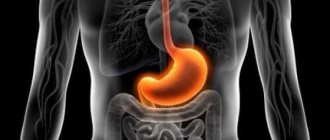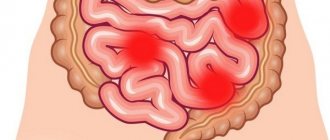Tablets for heaviness in the stomach
The feeling of heaviness is often accompanied by impaired intestinal motility - slow movement of feces through the intestines, slowing down the process of digestion of food. Tablets of different pharmacotherapeutic groups are effective for improving absorption, accelerating the digestive process and facilitating the passage of feces through the intestines.
If this condition recurs frequently, you should consult a doctor. The gastroenterologist will advise you on what to take after eating to relieve stomach heaviness, or prescribe additional diagnostics to rule out gastrointestinal diseases.
General recommendations
Pancreatin is taken before or with food.
A single dose ranges from 1 to 3 tablets, depending on the diagnosis.
The tablets are taken while maintaining an upright body position.
The integrity of the tablet should not be violated (break, chew) in order to avoid premature activation of enzymes and their irritating effect on the upper gastrointestinal tract.
Frequency of administration: 3 times a day (with food, once).
If the discomfort is not systematic and is not associated with any disease, 1-2 doses are sufficient.
In other cases, the duration of treatment ranges from 5 days to continuous, lifelong use (after removal of organs or parts thereof).
Higher dosages can only be prescribed by a doctor.
We recommend reading:
- why you can’t drink alcohol while taking Creon;
- taking enzymes in the treatment of pancreas;
- cheap analogues of Xenical.
Causes of heaviness in the stomach
The main reasons for the feeling of heaviness in the stomach:
- eating unusual foods and dishes;
- decreased enzymatic activity;
- binge eating;
- alcohol consumption;
- eating too fatty, spicy, hot foods.
Often the reason is either overeating or low activity of enzymes produced by the pancreas. Low enzymatic activity can be provoked by a violation of the diet or a pathological process - chronic pancreatitis.
The severity may be accompanied by additional symptoms from the gastrointestinal tract: nausea, vomiting, heartburn, bloating, belching. In this case, they talk about complex dyspeptic disorder. The same symptoms accompany food poisoning.
Indications for use
The use of the drug is indicated for:
- peptic ulcers associated with Helicobacter pylori infection;
- ulcerative process with pain in the stomach and duodenum, including those caused by stress;
- erosive and ulcerative lesions, including in the gastric mucosa, caused by the use of powerful anti-inflammatory drugs, liver cirrhosis;
- prevention of acid aspiration;
- reflux esophagitis (the nature of which is ulcers, erosions);
- acid-dependent dyspepsia;
- pathological hypersecretory conditions;
- Zollinger-Ellison syndrome.
Return to contents
When do you need a doctor's help?
You should not take medications for heaviness in the intestines and stomach if this condition recurs frequently and is accompanied by additional symptoms. Some patients complain of severe sharp pain in the epigastric region. This is a symptom of gastritis or hyperacidity. Urgent consultation with a doctor is necessary in the following cases:
- frequent repeated vomiting;
- bitter taste in the mouth, darkening of the tongue;
- presence of undigested food in stool or vomit;
- increased body temperature;
- diarrhea;
- exhaustion;
- lack of appetite.
Gastric pathologies may be accompanied by pale skin, abdominal pain, bloating, flatulence, and fatigue. Sometimes eliminating irritating foods from the diet leads to normalization of the condition.
If after eliminating such foods and dishes the symptoms do not disappear, you should consult a doctor. The gastroenterologist will prescribe diagnostic measures that will help identify the true cause of the severity and prescribe the most appropriate drugs for treatment.
Why does gastritis appear?
Gastritis is an inflammation of the gastric mucosa, which occurs with a change in the structure of the mucosa and its ability to regenerate.
In more severe or protracted cases, gastritis occurs with cell atrophy and in the future, the gastric mucosa and its walls can be replaced by connective or fibrous tissue. Gastritis can be both a separate disease and a symptom of dysfunction of the digestive system of other organs. Most often, gastritis acts as a separate disease.
The cause in some cases of gastritis lies in infection of the stomach with the bacterium Helicobacter pylori. It literally settles in the walls of the stomach, causing pain and indigestion.
In most cases, gastritis appears as a result of a negligent attitude to nutrition, regimen, and the foods consumed. As a rule, this attitude leads to the transition of gastritis to a chronic form. Chronic gastritis is much more difficult to control and treat. Treatment of gastritis with Pancreatin brings only temporary improvement.
Factors leading to gastritis:
- improper and unbalanced diet;
- abuse of salty, pickled and fatty foods;
- abuse of hot and spicy foods;
- alcohol abuse and smoking;
- food on the go, instant food;
- poorly chewed food;
- excessive use of medications that lead to dysfunction of the gastric mucosa;
Most popular drugs
The following drugs are most often recommended for home use:
- Mezim;
- Festal;
- Smecta;
- Ranitidine;
- Gastal;
- De-Nol;
- Motilium;
- Omeprazole;
- Pancreatin;
- Rennie.
Antacids are also popular: Phosphalugel , Almagel , Maalox , Adzhiflux . These are drugs from different pharmacotherapeutic groups. They may contain enzyme compounds that replace biologically produced enzymes and are involved in food digestion.
Antacids can reduce stomach acidity, normalize the production of gastric juice and the digestive process. Popular medications contain anesthetics to relieve pain and carminative compounds that relieve bloating.
Pancreatic enzymes
This is a group of products containing analogues of enzymes produced by the pancreas. In case of reduced functionality or insufficient quantities of secreted enzymes, drugs of this group replace them and participate in the process of breakdown of proteins, carbohydrates and fats.
Tablets of this group against overeating and heaviness in the stomach:
- Pancreatin;
- Creon;
- Mezim;
- Adzhizim;
- Eurobiol;
- Zentase;
- Innozyme.
They contain protease, lipase, amylase to digest various nutritional compounds. Effective for overeating fatty or unusual foods, dyspeptic disorders. Medicines in this group are contraindicated in acute pancreatitis or during its exacerbation, as well as intestinal obstruction.
Prokinetics
Medicines in this group block dopamine receptors and thereby stimulate gastrointestinal motility. They also have an antiemetic effect. Prokinetics combine a large number of subgroups, including agonists of acetylcholine and motilin receptors. All of them enhance peristalsis and motility, eliminate congestion and stimulate the movement of feces.
Representatives of the prokinetic group:
- Domidon;
- Motoricum;
- Perilium;
- Brulium Lingvatabs;
- Peridonium;
- Rabiril;
- Cinnaridone.
Contraindicated in cases of severe diseases of the liver, kidneys, heart and blood vessels. Prohibited in case of intestinal bleeding, mechanical obstruction or intestinal/stomach perforation.
Antacids
Antacids are the most commonly used tablets after meals for heaviness in the stomach. They should be taken no earlier than 1.5 hours after eating to prevent digestive disorders. Antacids can eliminate belching, heartburn, bloating, and congestion in the gastrointestinal tract by reducing high acidity and normalizing the production of gastric juice.
Representatives of the group of antacids:
- Gaviscon;
- Maalox;
- Rennie;
- Almagel;
- Phosphalugel;
- Ajiflux.
Medicines in this group are contraindicated in severe renal impairment, osteomalacia or osteoporosis, as well as in Alzheimer's disease. Use for acute abdominal syndrome is prohibited. In old age, caution is required.
Antispasmodics
Drugs from the group of antispasmodics eliminate spasms of the smooth muscles of the intestines and stomach, which prevent the normal movement of masses through the intestines and the digestion process in the stomach. The most common antispasmodics:
- No-Shpa;
- Papaverine;
- Drotaverine is a cheap analogue of No-Shpa;
- Drospa Forte;
- Dolce;
- Nispasm.
In terms of price, these are the most affordable drugs for the feeling of heaviness, but they will only be effective if the heaviness is caused by spasms. They also have limitations in use: severe kidney, liver or heart failure. Drotaverine is approved for children over 6 years of age.
Proton pump inhibitors
Medicines in this group exhibit an antisecretory effect due to inhibition of the release of hydrochloric acid. They act on cells that transport protons for the synthesis of hydrochloric acid. The entry of the latter into the stomach is limited, and if the discomfort was caused by increased acidity, the heaviness in the stomach goes away and the digestion process is normalized.
Medicines from the proton pump inhibitor group:
- Omeprazole;
- Pantoprazole;
- Rabeprazole;
- Lansoprazole;
- Omealox;
- Omep;
- Orthanol.
The result of improper use of these medications can be the formation of benign cysts. It is recommended to consult a doctor before using them.
"Pancreatin" - instructions for use
If the doctor has not given any special instructions, then taking tablets (capsules) can be done according to the following scheme:
- Adolescents 10-14 years old are prescribed medicine 2 tablets. simultaneously during meals;
- Children 6-9 years old are recommended 1 tablet/day;
- The dose for adults consists of 2-4 pcs. from 3 to 6 times/day.
When the gastric mucosa becomes inflamed, its structure is disrupted, which leads to dysfunction of the organ. “Pancreatin” for gastritis will help to quickly overcome the exacerbation of the disease, and if the pathology is in the chronic stage, then the medicine will stimulate and replenish the missing gastric enzymes. By taking the drug, a person helps process food entering the stomach. The course of treatment depends on the stage of the disease, and lasts from several days to several months (at least two for complex pathologies).
Traditional methods
In case of isolated manifestations of severity as a result of overeating, folk remedies may be effective. The use of herbal preparations is recommended. You should not use products such as soda, drinks with a weak solution of vinegar and other dubious folk recipes that have a detrimental effect on the gastrointestinal tract.
If the gastrointestinal tract is disrupted, it is recommended to take a collection of calendula, St. John's wort and yarrow herbs, which can be bought at the pharmacy. Taking one teaspoon of each collection, they are steamed with boiling water and left for half an hour. The resulting decoction is taken half an hour before meals.
Another effective folk remedy is tea made from chamomile or its flowers. They are brewed and taken instead of regular tea. Chamomile is sold in packaged form, so you do not need to dose it yourself. The plant also has a pronounced bactericidal and anti-inflammatory effect.
Elimination of heaviness in the abdomen during pregnancy
During pregnancy, most drugs of synthetic origin are contraindicated. But it is during pregnancy, when the enlarging uterus puts pressure on the intestines, that a feeling of heaviness occurs most often. The doctor may recommend the use of folk remedies and herbal teas.
In cases where traditional methods are ineffective, antispasmodics can be prescribed. Pregnant women are allowed only No-Shpa or Drotaverine, which should be taken only under the supervision of a doctor.
If gastritis or other pathologies of the digestive tract are detected, pregnant women are prescribed inpatient treatment aimed at improving general well-being and maintaining pregnancy.
Adverse reactions and overdose
The pharmaceutical product Omeprazole rarely causes negative effects, which include:
- attacks of nausea and vomiting;
- disturbance of stool with constipation;
- pain in the abdomen;
- allergy;
- feeling of dryness in the mouth;
- disturbed blood composition;
- discomfort in the muscles and moving joints;
- depression, increased irritability;
- liver dysfunction.
Side effects are more likely to occur in patients who take Omeprazole for more than 14 days or uncontrollably. In case of an overdose, a feeling of constant drowsiness is likely, and the heart rhythm is disturbed. If patients do not comply with the prescribed dose, they may experience confusion, visual impairment, and headaches. It is also possible that the oral mucosa may dry out and develop tachycardia.











